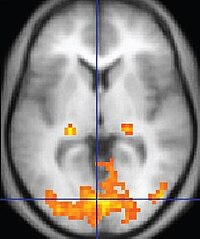
Photo from wikipedia
Measures of fMRI brain entropy have been used to investigate age and disease related neural changes. However, it is unclear if movement in the scanner is associated with brain entropy… Click to show full abstract
Measures of fMRI brain entropy have been used to investigate age and disease related neural changes. However, it is unclear if movement in the scanner is associated with brain entropy after geometric correction for movement. As age and disease can affect motor control, quantifying and correcting for the influence of movement will avoid false findings. This paper examines the influence of head motion on fMRI brain entropy. Resting-state and task-based fMRI data from 281 individuals born in Aberdeen between 1950 and 1956 were analyzed. The images were realigned, followed by nuisance regression of the head motion parameters. The images were either high-pass filtered (0.008 Hz) or band-pass (0.008–0.1 Hz) filtered in order to compare the two methods; fuzzy approximate entropy and fuzzy sample entropy were calculated for every voxel. Motion was quantified as the mean displacement and mean rotation in three dimensions. Greater mean motion was correlated with decreased entropy for all four methods of calculating entropy. Different movement characteristics produce different patterns of associations, which appear to be artefact. However, across all motion metrics, entropy calculation methods, and scan conditions, a number of regions consistently show a significant negative association: the right cerebellar crus, left precentral gyrus (primary motor cortex), the left postcentral gyrus (primary somatosensory cortex), and the opercular part of the left inferior frontal gyrus. The robustness of our findings at these locations suggests that decreased entropy in specific brain regions may be a marker for decreased motor control.
Journal Title: IEEE Journal of Biomedical and Health Informatics
Year Published: 2020
Link to full text (if available)
Share on Social Media: Sign Up to like & get
recommendations!